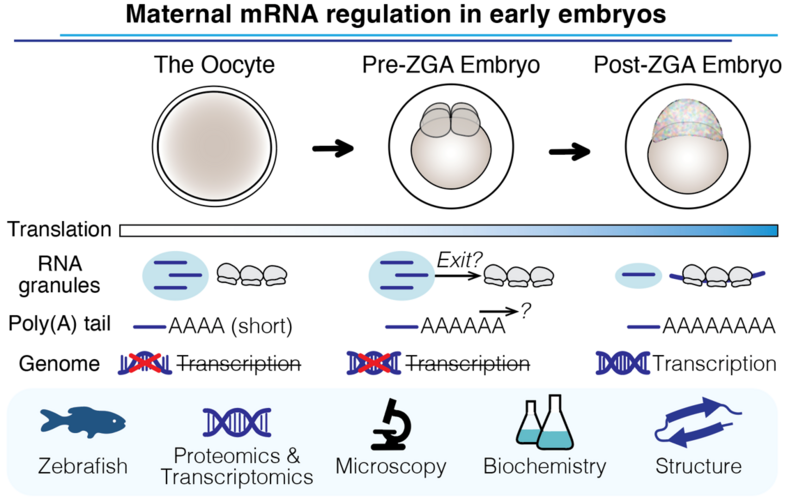Projects Offered
Petra Beli Mark Helm Ulrich Hohmann Edward Lemke Laura Lorenzo Orts Katja Luck Helle Ulrich Siyao Wang Johannes Mayer_DC3 Johannes Mayer_Interactome Wolfram RufMolecular mechanisms regulating maternal mRNA activation in vertebrate embryos
1 PhD project offered in the IPP winter call Molecular Mechanisms in Genome Stability & Gene Regulation
Scientific Background
Every animal life begins with a fundamental challenge: transitioning from a maternally programmed oocyte to an embryo driven by its own genome. To support this critical phase, mothers equip oocytes with a toolkit of molecular components, including maternal mRNAs. These messages regulate protein production and guide early development before the embryo takes control of its own gene expression. But timing is crucial. If maternal mRNAs are translated too early, development can be disrupted. To prevent this, embryos have evolved sophisticated strategies, like poly(A) tail shortening and mRNA sequestration into granules, to keep these transcripts silent until the right moment.
While much is known about how translation is repressed in early embryos, the mechanisms that govern activation and timely translation of maternal mRNAs remain less understood. Our lab is dedicated to uncovering these processes. Using a combination of in vivo and in vitro tools, we investigate how these regulatory systems function, why they are essential, and how their molecular architecture ensures proper embryonic development.
PhD Project: Protein Factors Mediating the Transition from Maternal mRNA Storage to Translation
Maternal mRNAs stored in the egg are essential for early development, yet the molecular events that awaken these transcripts remain poorly understood. During my postdoc, I identified proteins and mRNAs localized to storage granules in early zebrafish embryos. Many of these proteins are established translational repressors, but intriguingly, I discovered links between storage granule components and the translation machinery. In particular, I found that a P-body protein directly interacts with a translation initiation factor, suggesting the existence of a novel molecular “switch” capable of activating dormant mRNAs.
Our lab combines in vivo and in vitro approaches to study maternal mRNA regulation across multiple levels. Zebrafish is our primary in vivo model, offering powerful genetic tools and abundant embryos for applications such as proteomics, microscopy, and transcriptomics. We complement these studies with protein biochemistry and structural biology to link molecular mechanisms with their developmental consequences.
If you are interested in this project, please select Lorenzo Orts as your preference in the IPP application platform.
Publications relevant to this project
Lorenzo-Orts L#, Strobl M, Steinmetz B, Leesch F, Pribitzer C, Roehsner J, Schutzbier M, Dürnberger G, Pauli A# (2023) eIF4E1b is a non-canonical eIF4E protecting maternal dormant mRNAs. EMBO reports 25, 404–427 (# indicates joint correspondence)Link
Lorenzo-Orts L# and Pauli A (2024) The molecular mechanisms underpinning maternal mRNA dormancy. Biochemical Society Transactions 52:861-871 (*sole corresponding author) (review) Link
Leesch F*, Lorenzo-Orts L*, Pribitzer C, Grishkovskaya I, Roehsner J, Chugunova A, Matzinger M, Roitinger E, Belačić K, Kandolf S, Lin T-Y, Mechtler K, Meinhart A, Haselbach D, Pauli A (2023) A molecular network of conserved factors keeps ribosomes dormant in the egg. Nature 613: 712-720 (* indicates equal contribution) Link
Contact Details
Dr Laura Lorenzo Orts
Email

